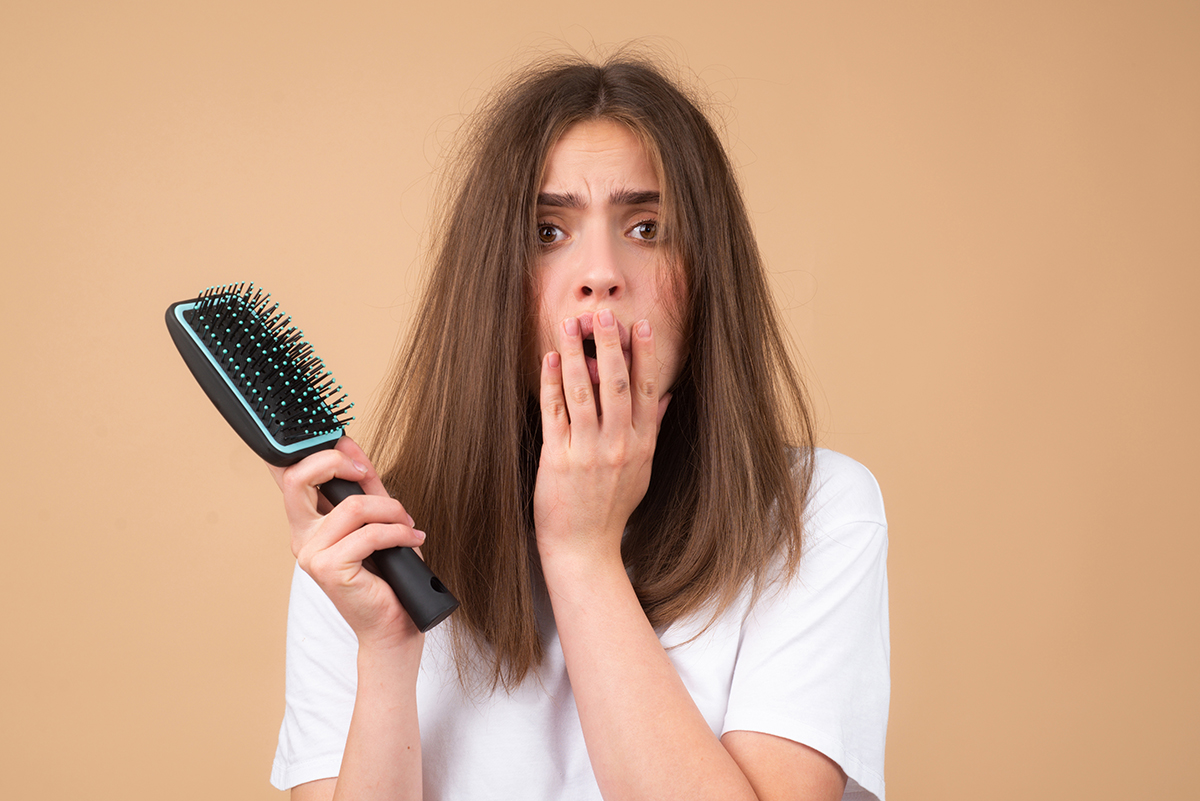Hair loss is now becoming a major concern to most American men, women, and children. Surprisingly, the statistical numbers are quite a scare:
As based on the International Society of Hair Restoration Surgery (ISHRS) 2020 survey, the number of American people looking for proven medical and surgical treatments for hair loss grew 13 percent from 2016 to 2019.
- 1,401,589 patients treated non-surgically (2019)
- 681,964 patients with surgical treatment (2019)
- 157 percent increase in hair restoration from 2008 to 2019
With several hair loss treatments all over the market, either non-surgical or surgical, finding the hair loss treatment solution is still a big challenge ahead.
Causes of Hair Loss
1. Androgenetic Alopecia
Androgenetic Alopecia is the most common hair loss condition, which affects 95 percent of men and some women also. It is genetic in nature for both men and women, where men lose hair from the temples and crown of the head, while for women the hair becomes thinner.
2. Deficient Nutrition
Extreme diet, limited food intake, or deficiency in nutrients can cause hair thinning to patches of baldness. Which include nutrient deficiencies from iron, zinc, biotin, and amino acids (protein). Consulting immediately with your doctor is the next best thing to do if you notice hair falling out due to nutritional deficiency.
3. Emotional Stress
4. Medications
- Anabolic steroids
- Acne Medication(Accutane)
- Antidepressants (Prozac and Zoloft)
- Blood Thinners
- Beta and Calcium Channel Blockers
- Cholesterol-lowering Drugs (Lopid)
- Chemotherapy Drugs
- Contraceptive Pills
- Drugs for Depression
- Oral Contraceptives
- NSAIDs
- Some Hormone Replacement Therapy
5. Post-Pregnancy
After giving birth some women may experience hair loss or thin of hair. This happens because of fluctuating hormonal levels after pregnancy and childbirth. However, on the brighter side after the body recovers back to normal all the hair will grow again.
6. Thyroid Problems
Hypothyroidism and hyperthyroidism can cause hair loss because of hormonal imbalance. Hormones play a major role in regulating bodily functions, particularly hair growth. Treating these thyroid conditions can stop hair loss and grow back again.
7. Excessive Hair Care
Hair follicles are sensitive to extreme treatment that can cause damage and breakage to strands:
- frequent blow-drying
- pulling on hair
- repetitive use of heated styling tools
- shampooing
- vigorously scalp rubbing
8. Infections
- Bacterial infections(Syphilis)
- High fever
- Folliculitis
- Fungal skin infection
- Ringworms
- Seborrheic Dermatitis
9. Birth Control Pills
- Desogen
- Ortho-Cept
- Ortho-Cyclen
Hair Loss Treatments
Currently, the Food and Drug Administration (FDA) is still doing research and studies on hair loss treatments and medications. However, below are some of the approved hair treatments:
1. Minoxidil
Since 1990, this topical hair treatment has been treating baldness for both men and women over the years. Minoxidil stimulates hair growth and slows down balding. Generally, it is considered safe and effective for people aging under 40 years of age and with recent hair loss.
- Effective and Safe
- Application (Scalp Skin): 1x -Women /2x-Men
- Hair Regrowth Seen: After 6 months
- For both men and women
2. Finasteride Shampoos
- Safe and Effective
- Slows down hair loss rate with new hairs growing
- Hair Regrowth Seen: Few months
- For men only
Other Treatments (No FDA Approval)
-
Hormone Therapy - this hormonal treatment is beneficial for women only. It works where the progesterone prevents testosterone conversion to DHT. Azelaic acid and spironolactone medications are used to block DHT in women. Usually, both medications are compounded in topical preparations.
-
Topical Melatonin - topical melatonin solution is another promising treatment for AGA methods. Studies found effective results for both men and women with no increase in serum melatonin levels
Other Women Medications (No FDA Approval, but effective for some)
- Azelaic Acid
- Biotin
- Estrogens
- Finasteride and other alpha-reductase enzyme inhibitors
- Fluocinonide
- Ketoconazole
- Latanoprost
- Niacinamide
- Prostaglandin analogs
- Progesterone
- Saw Palmetto
- Spironolactone and other anti-androgens
- Steroids
- Tretinoin
- Zinc Sulphate
Additional Practical Hair Loss Treatments:
- Cause: Stress or hormonal changes(Pregnancy)
- Treatment: No treatment. The hair will grow back after the period has passed.
- Cause: Hair Styling Practices (Braids/Ponytails)
- Treatment: Stop doing what caused the damage
- Cause: Thyroid Health Issue
- Treatment: Treat the thyroid conditions, and hairs will grow back
- Cause: Poor Nutrition
- Treatment: Supplements like multivitamins like biotin. Also, Minoxidil solution is best for Female Pattern Hair Loss (FPHL) as approved by FDA.
- Cause: Infections
- Treatment: Treat the infection problem.
- Cause: Birth Control Pills
- Treatment: Stop taking the pills, and hair will regrow again
Florida’ Most Trusted Compounding Pharmacy
For the past 30 years, Myerlee Pharmacy provides premium, affordable, and customized compounded drug formulations of medications to customers in Fort Myers, Florida, and the surrounding areas around.
Lee County. Our unique compounded drug formulations of medication hair loss treatments are effective and safe to stop hair loss and regrow again your hair.
Myerlee Pharmacy has served physicians and customers since 1991 and has established itself in Lee County as a well-respected leader in the pharmaceutical compounding industry. Our on-site sterile compounding pharmacy is the only pharmacy in Lee County with a sterile license from the State Board of Pharmacy and is equipped with an ISO Class 7 Clean Room that meets USP 797 guidelines.
Discover to learn more about hair loss treatment and other services with Myerlee Pharmacy at 239-482-3022, or contact us online today!




